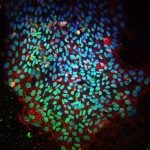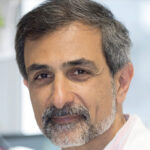Link to Pubmed [PMID] – 25344672
Results Probl Cell Differ 2015;56:191-213
Skeletal muscles in vertebrates have a phenomenal regenerative capacity. A muscle that has been crushed can regenerate fully both structurally and functionally within a month. Remarkably, efficient regeneration continues to occur following repeated injuries. Thousands of muscle precursor cells are needed to accomplish regeneration following acute injury. The differentiated muscle cells, the multinucleated contractile myofibers, are terminally withdrawn from mitosis. The source of the regenerative precursors is the skeletal muscle stem cells-the mononucleated cells closely associated with myofibers, which are known as satellite cells. Satellite cells are mitotically quiescent or slow-cycling, committed to myogenesis, but undifferentiated. Disruption of the niche after muscle damage results in their exit from quiescence and progression towards commitment. They eventually arrest proliferation, differentiate, and fuse to damaged myofibers or make de novo myofibers. Satellite cells are one of the well-studied adult tissue-specific stem cells and have served as an excellent model for investigating adult stem cells. They have also emerged as an important standard in the field of ageing and stem cells. Several recent reviews have highlighted the importance of these cells as a model to understand stem cell biology. This chapter begins with the discovery of satellite cells as skeletal muscle stem cells and their developmental origin. We discuss transcription factors and signalling cues governing stem cell function of satellite cells and heterogeneity in the satellite cell pool. Apart from satellite cells, a number of other stem cells have been shown to make muscle and are being considered as candidate stem cells for amelioration of muscle degenerative diseases. We discuss these “offbeat” muscle stem cells and their status as adult skeletal muscle stem cells vis-a-vis satellite cells. The ageing context is highlighted in the concluding section.

